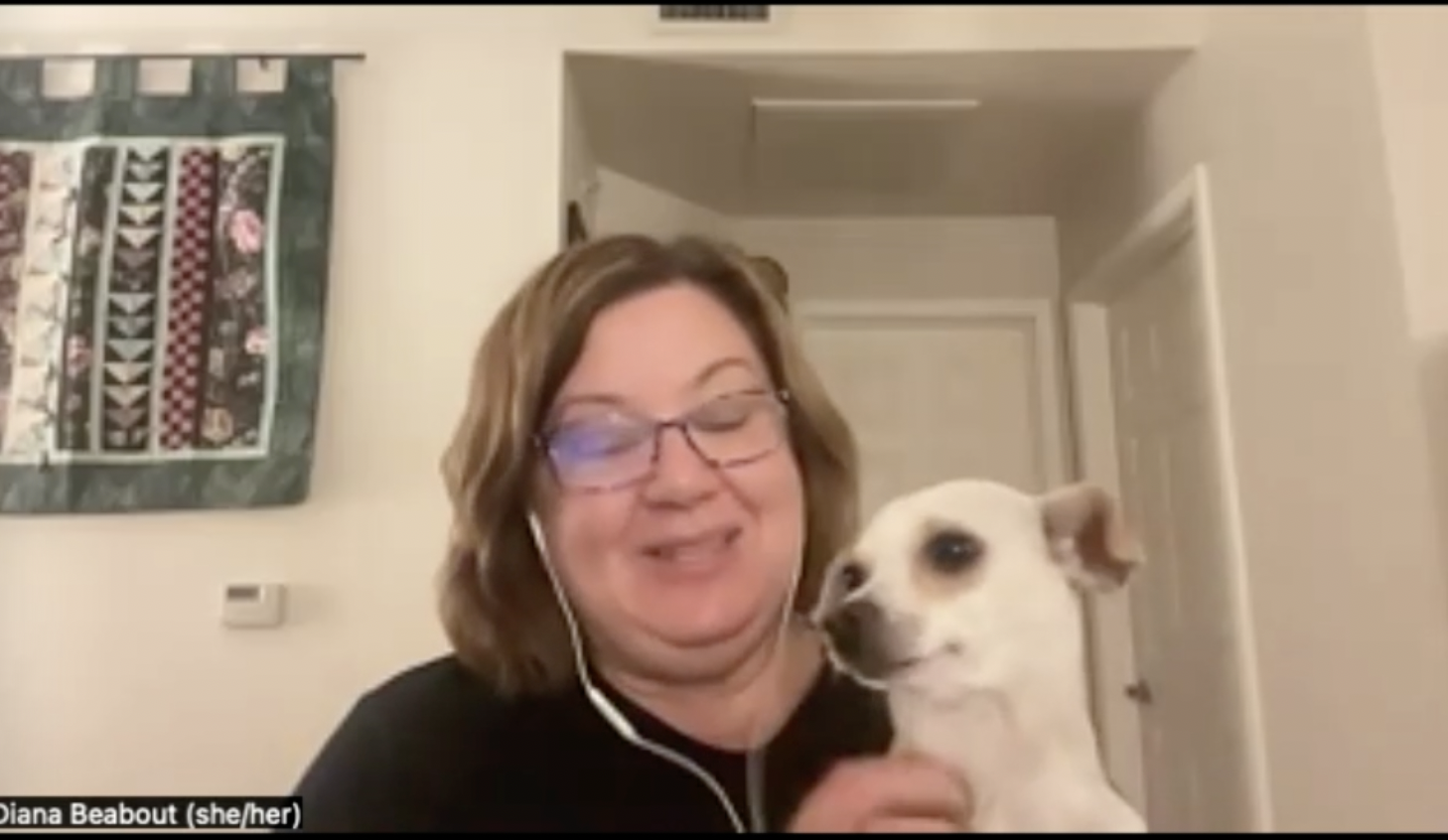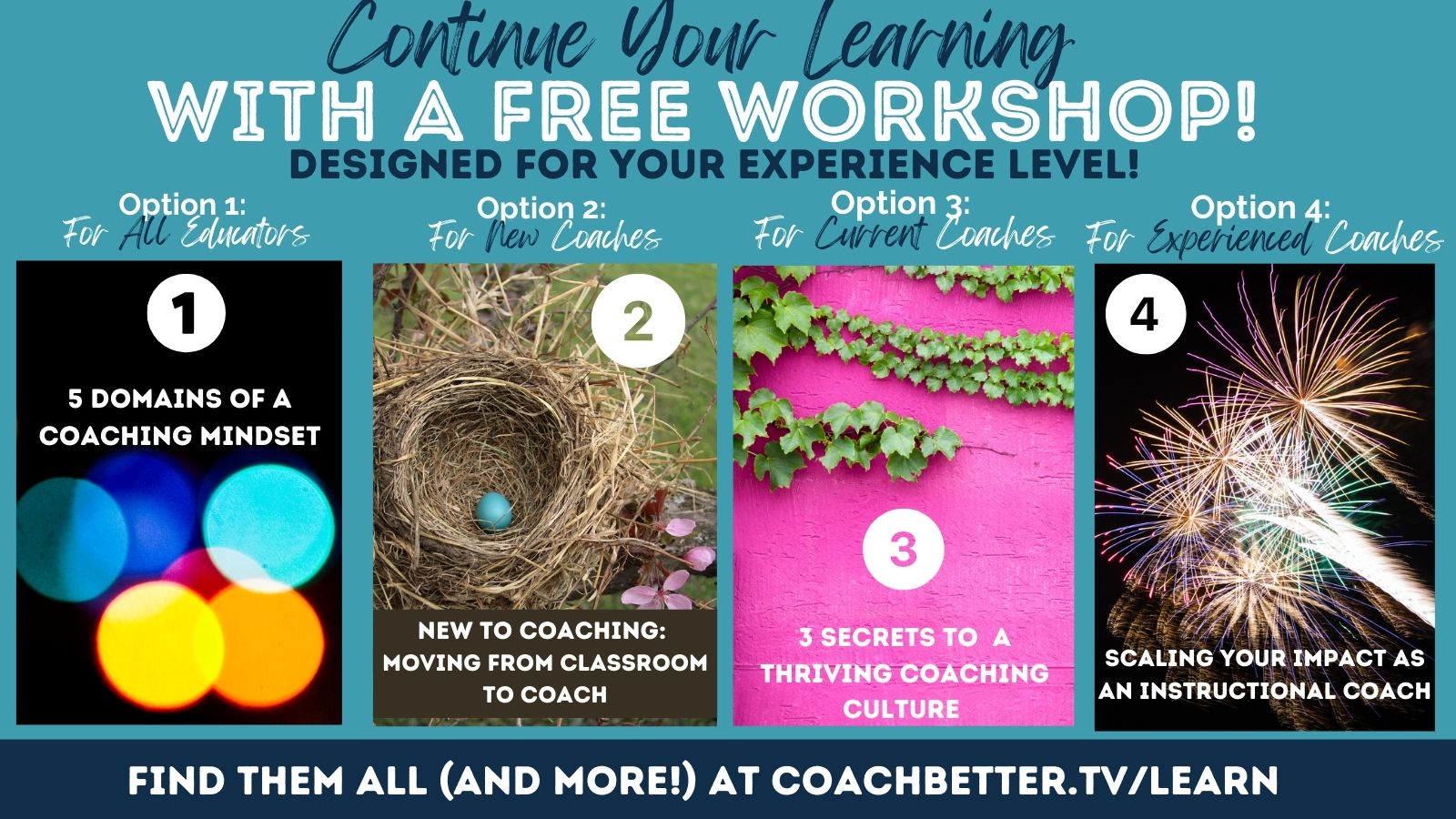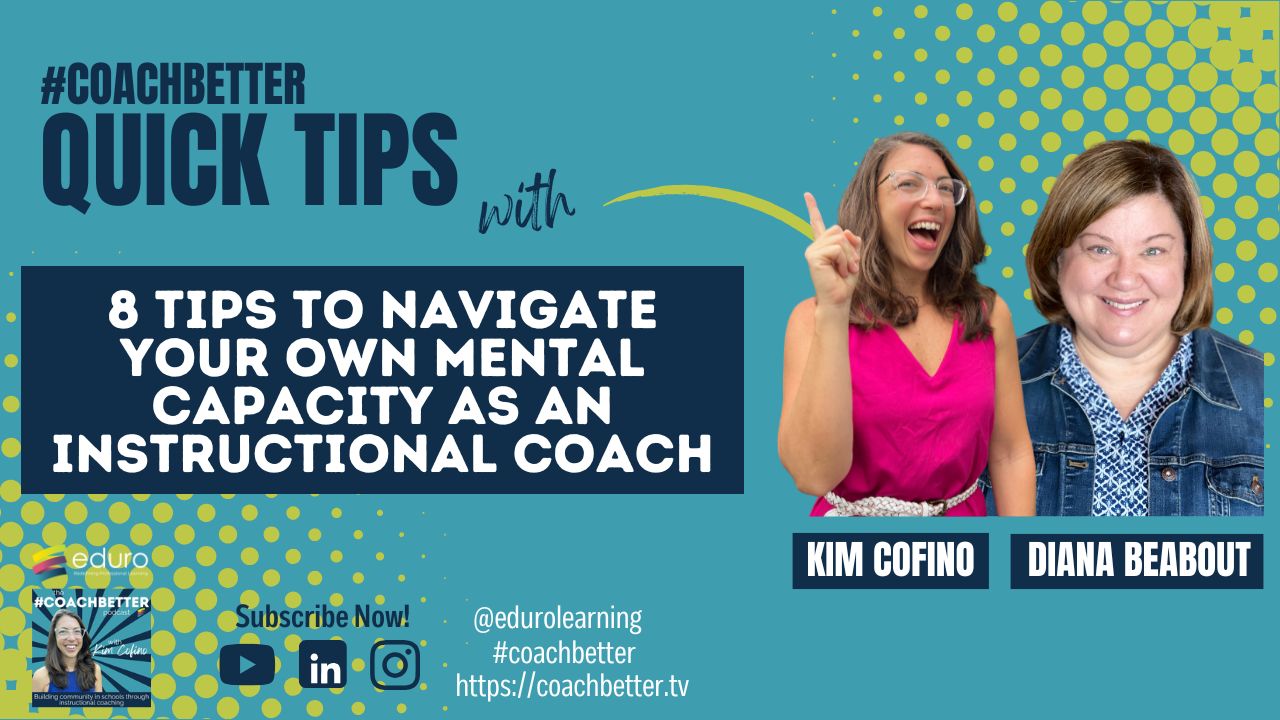This has been a really challenging spring.
Diana and I have both been at max capacity managing some major life and work stressors.
We recently had a conversation about the ways that we are trying to navigate being on overload for an extended period of time.
And we know that we’re not alone.
So, we thought we would share our strategies with you!
As coaches, it’s in our nature to want to help everyone, to put ourselves last and support others first. But, as Cindy Tisdale-McPhee said on a very early episode of the podcast, for coaches to be present for others, they must take care of themselves first.
It’s so important to recognize that we can’t do everything, all the time, all at once. When your cup is full, you simply can’t pour anymore in – and that means taking a step back, taking a breath and taking a hard look at what is going on. So, that’s what we’re going to be sharing today.
We’d love to hear your suggestions and strategies too, so please leave a comment below with one of your tips! Or if you try any of these and find them helpful for yourself, please let us know in the comments too!
8 Strategies to Navigate Your Mental Capacity
1: Revisit Boundaries
As coaches, we know how important it is to have clear boundaries, to know what we are able to do, what’s within our scope of practice, and what is beyond our time and energy. When we’re feeling extra stretched, we may need to re-visit those boundaries.
More often than not, those are our own boundaries that we set for ourselves. It can be very challenging for coaches who naturally want to help and support, and can find ourselves bending our own boundaries to support others. If / when we find ourselves stretched too thin, it might be worth coming back to and revisiting our own boundaries and reminding ourselves that we need to prioritize our own health and wellbeing before we can help others – like putting your own oxygen mask on before you help others.
2: Express Yourself
Sometimes it just really helps to talk it out. Whether it’s with a trusted colleague, a friend or even a family member. Taking time to talk through whatever is putting you “over the edge” can be a valuable way to sort out your feelings, let go of some of the ongoing stress, and just feel seen, heard and listened to. My sister and I actually use a coaching strategy when one of us brings up something that is stressing us out or bothering us- whoever is listening will ask “do you just need to share and get it out or do you want some input?” This has helped us not just jump in and try to help solve the issue. Sometimes it can be enough just to get what’s bothering us out in the open. Other times it can lead to a more indepth coaching conversation – yes, coaching conversation strategies work with siblings and friends as well!
What’s YOUR level of coaching mastery?
All coaches go through various stages of coaching mastery. Once you identify where you’re at, you can begin to build the skills needed to move to the next stage.
This quiz is based on real-life case studies compiled from years of working with coaches inside The Coach Certificate & Mentorship Program!
When you receive your results, you’ll also get your matching case study from the STRIVE Case Studies to see where you fit in the stages of coaching mastery.
Ready to tackle your challenges and move on to the next level in YOUR coaching practice?

The STRIVE Model of Coaching Mastery quiz will help you identify your level of coaching mastery by matching you with case studies compiled from years of working with coaches inside The Coach Certificate & Mentorship Program so you can easily see where you fit!
When you complete the quiz, you’ll get:
- Your matching case study,
- Specific strengths & challenges aligned to your result;
- Suggested next steps for each stage;
Plus the Case Study Document includes:
- Case studies leveled by coaching mastery;
- A framework to identify essential stages of professional growth & key areas to focus on in your professional learning;
- Alignment with the THRIVE Model for a Successful Coaching Culture;
- Space for you to reflect & prioritize so you can take action immediately!
You’ll go straight to the Quiz, and get the Case Studies by email.
3: Strategizing
Fully understanding what it is that’s stressing you out – and getting yourself organized and ready with a strategy can really help address feelings of overwhelm. Sometimes all the things are just rolling around in your brain, taking up active thinking space (I always think of this as my RAM) and you can’t even process where you need to start, because so many things are taking up space in your brain.
For me, it really helps me to write it down. A few times a year, I max out on all my things and I know I need to have a “post it party” to get them all out of my brain.
If you want to try a post-it party too,here’s how it works:
- Take out several pads of different color sticky notes.
- Write down each individual thing you’re thinking about on a separate note
- Group like tasks together into piles (if you’re like me, you might discover you have many similar tasks taking up space in your brain, and realizing you can put many things together can be helpful).
- Move the consolidated piles of stickies into order of priority,
- Identify what really needs to be done first – and start setting aside the things that are less urgent or important.
- Then, use the 4D method to get everything organized:
- What do you need to DO right now
- What can you DELEGATE to someone else? (In our case, often this might be sharing the workload with another person)
- What can you DELAY until later?
- What can be DELETED? (Sometimes if something has been on my to do list for long enough, I realize I just don’t actually need to do it and it can be deleted!
Just having all of the many many things in some kind of priority order creates a huge amount of mental space.
If you have the capacity to do this on a regular basis – monthly, quarterly, whatever rhythm works for you, you might find that you tend to get less overwhelmed (I’m saying this out loud for myself too!)
4: Ask for help
It’s so important to have someone you can ask for an outside perspective to help provide you with a different way to approach an issue or challenge (coaches need coaches) . This can be so hard for those of us who are always there for others but expect to handle our own challenges ourselves. I am so guilty of this! It can be hard to ask for help but we need to get out of our own heads sometimes to take a practical look at what is going on. And that means we need to ask for some help getting that perspective and then accomplishing our goals. As a team leader for AAICIS, I know I can have a hard time delegating (right, Kim!) but I occasionally need to take a step back and remember that just like I would step up to help others, I have amazing colleagues and teammates who just need me to ask and they will help carry the load.
5: Find a Creative Outlet
When we are feeling overwhelmed and stressed, especially when it’s more than we can handle, having an alternate outlet for our thinking can help us not only relax, but allow our brains to process what has been going on without directly thinking about it.
Often something we would typically label as “art” can be helpful in this space. Something artistic or crafty that allows you to not only express yourself, let your mind wander, and also involves some kind of movement or action can be especially helpful.
This spring I’ve discovered that having an actual activity and a creative outlet allows my brain to focus on something completely different – and feel a sense of accomplishment when I finish whatever I’m working on.
I’m currently enjoying journaling (I went from zero journals in December to now a daily, a hobbies and habits journal, a book journal and a junk journal), doodling and watercolor. All of these things are completely new to me this year, but they are the perfect kind of calming activity for me that lets my brain focus on something else, so I can spend enjoyable time and feel a sense of growth, accomplishment and discovery every time I create something new.
6: Let things go!
Being OK with letting things go. Does this have to happen now? Or can I let it go?
Especially when things get overwhelming, its okay to prioritize and focus on what is most important to you personally and professionally. And sometimes that means that some things will need to be set aside for now….or even dropped from your To Do list.
Recognizing what you do / do not have control over and what’s within your own sphere of control. I know many of us just want to take on whatever comes our way, but that is not feasible. We need to be realistic about what and where we can have an impact and put our time and energy there.
7: Movement:
When we are feeling stuck, one of the best ways to get unstuck is to physically move. This could be as simple as going for a short walk outside, or just walking over to a window to get some fresh air. It could be doing something more physical like going to the gym, a yoga class, or another kind of fitness activity. Or it could just be finding a hobby that allows you to move your body in a new way – and maybe even make some new friends while you’re at it!
If you’ve been around this channel for a while, you know I compete in a sport called powerlifting where we work towards finding our max strength in a single rep of squat, bench and deadlift. There are so many days where I don’t feel like I have the time or mental space to train, but as soon as I start lifting, I know that I made the right choice. Movement, and doing something completely different, is a great way to get out of your own head and re-focus on your physical wellbeing. If you can make time for movement – even just a little bit – every single day, you will likely start feeling even better physically, but also mentally too!
8: Bonus: hang out with your dog!
If you’re so lucky to have a pet, spend time with them! Here’s Diana and her adorable pup, Bo!

There’s no one right-way to manage stress and challenges, but hopefully some of these ideas have given you a pathway forward and a reminder that you are not alone.
Watch the Video
If this kind of support is something you might find valuable in your practice as a coach, this is also part of the work Diana and I do with our clients in The Coach Certificate and Mentorship Program, and in our private mentoring packages for coaches and educators. We’re here to support you too!
Navigating a stressful and challenging job like instructional coaching is not easy – that’s why we include this concept in ALL of our courses for coaches – at the level that’s right for your experience.
Each of our global cohorts will help you take the next step in your coaching practice:
- as an educator or leader ready to learn about a coaching mindset in Cultivating a Coaching mindset, or
- a brand new or aspiring coach in Getting Started as an Instructional Coach, or
- a current coach or educator ready to build a thriving coaching program in The Coach Certificate and Mentorship Program, or as
- a coach who’s ready to lead in Coaches as Leaders.
Find all the details about all of our courses for coaches at coachbetter.tv/learn and select the course that’s just right for your current experience level.
Global cohorts open once a year.
Find all the details for each course at coachbetter.tv/learn
Free Workshops for Instructional Coaches
If you’re ready to keep learning, try one of our FREE workshops where you’ll be able to dig deeper into the concepts in this post, and get a peek at all of our courses for coaches.
We have workshops (and courses) to support coaches at every stage of their career: from educators curious about coaching, to new and aspiring coaches making the move from classroom to coach; to current coaches ready to be more intentional and strategic in their practice; to established coaches leveraging their coaching experience to lead.

You can them all on our coachbetter website at coachbetter.tv/workshops
If you’re curious right now, you have questions, please reach out. You can leave a comment below, join our #coachbetter Facebook group, or find us on social media at Eduro Learning and send me a DM. I’d love to support you on your coaching journey. See you next time!
Connect with us!
Subscribe to the podcast iTunes |Spotify|Stitcher
Follow us on social media: Instagram |LinkedIn
Join our #coachbetter Facebook group

Recent Comments